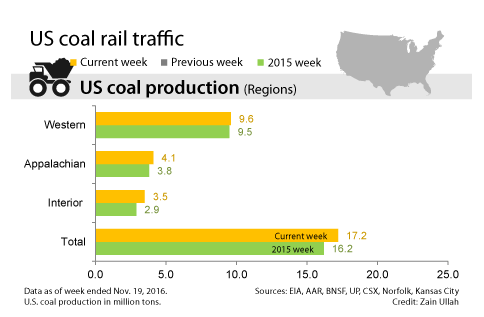The American Coal Council congratulates President-elect Donald Trump on his victory in yesterday’s presidential election. President-elect Trump knows the strategic importance of energy in America. This includes our abundant coal resources, larger than those of any other country in the world. He supports coal and energy jobs as an integral part of a strong economy. He understands the urgent need to rein in the Washington bureaucracy and sweeping, excessive regulations in order to protect jobs, retain and grow our nation’s industrial and manufacturing base, and reduce the costly burden of rules that lack commensurate benefits. "The coal sector has been devastated by lower demand and job loss in recent years due to the mounting impact of regulations pointed squarely at our industry. These regulations have significantly increased the cost of coal for electricity generation and industrial use, made it less competitive against other fuels, and resulted in the closure of a large number of coal plants", American Coal Council CEO Betsy Monseu said. "Rather than offer environmental benefits, regulatory streamlining, and business planning certainty, regulations have become about costs, administrative burdens, and lost jobs." With a significant loss of coal demand made permanent due to plant closures, it will be critical to protect the investments made in the remaining coal generation fleet. These plants are essential for our nation’s power sector to deliver reliable 24/7 electricity to American homes, hospitals, and schools as well as business enterprises and manufacturers of steel, cement, chemicals, paper, and other industrial products. The path forward for coal must also include new technologies and uses. We look forward to working with President-elect Trump and the members of Congress to begin the process of restoring coal and rebuilding the nation’s economy. Visit https://www.naylornetwork.com/ccw-liveupdate/articles/index.asp?aid=415597&issueID=47519 to view the full article online.
|
At one of the first industry-wide gatherings since Election Day, the coal sector offered cautious optimism about the Trump administration's impact on the industry after years of challenges. Gathered in New York for the 15th Annual Coal Trading Conference on Dec. 5 and 6, industry representatives offered their takes on election results that, admittedly, few saw coming. Throughout this year's presidential campaign, Donald Trump pledged support for the coal industry, promising on several occasions to push back on Obama administration regulations often cited as detrimental to the industry and to "put miners back to work." The response from coal-producing regions was resounding, with states like West Virginia and Kentucky delivering some of Trump's largest margins of victory in November. However, with the campaign now behind him, it is unclear what the president-elect will be able to do to increase production to boost employment. Visit http://www.coalblog.org/2016/12/10/coal-offers-cautious-optimism-for-trump-at-first-post-election-conference/ to view the full article online.
|
A Donald Trump White House will likely give a boost for the U.S. coal industry and do away with key current and pending environmental regulations, but significant policies need to be put in place to make long-term improvements to the coal business, industry executives said Tuesday. Fred Palmer, partner at Total Spectrum/Steve Gordon and Associates and former senior vice president of government relations at Peabody Energy, and Richard Reavey, vice president of public affairs at Cloud Peak Energy, each spoke at the Coal Trading Association's 15th annual Coal Trading Conference in New York about how President-elect Trump could bring life into an improving but long-ailing industry. Palmer called the election of a Trump "a key moment in U.S. history" and said he expected the country will move forward and support his pro-coal energy policies. "It will be an American Renaissance; an energy Renaissance; a fossil fuel Renaissance, and coal will be part of it," Palmer said. Visit http://www.platts.com/latest-news/coal/newyork/trump-needs-to-think-long-term-to-really-help-21266286 to view the full article online.
|
In recent years, the challenges have been numerous, to put it mildly. Undoubtedly, many of those challenges have been market-driven. But, without question, there have been unprecedented regulatory pressures as well. The recent election has provided coal operators -- and those of us who represent them -- with a sense of optimism about the future regulation of coal. Recently, my colleagues and I met to discuss the areas where the regulation of coal needs to be reexamined. While that list was too long to share, we will look at eight key areas where change is needed. Visit http://www.coalblog.org/2016/12/10/after-the-election-what-coal-needs-most/ to view the full article online.
|
President Obama pledged to wield a pen and phone during his second term rather than engage with Congress. The slew of executive orders, enforcement memorandums, regulations and "Dear Colleague" letters comprised an unprecedented assertion of executive authority. Equally unparalleled is the ease with which the Obama agenda can be dismantled. Among the first actions on President Trump's chopping block should be the Clean Power Plan. Visit http://www.coalblog.org/2016/12/10/trump-can-ax-the-clean-power-plan-by-executive-order/ to view the full article online.
|
|
The Daily Caller, Andrew Follett, 12/4/2016
President-elect Donald Trump could eliminate these five Environmental Protection Agency (EPA) regulations some studies have labeled as "job-killers" that do little for the environment. Under President Barack Obama, the EPA made individual rules and regulations that cost hundreds of thousands of jobs. Given the high costs, Republican lawmakers encouraged states not to implement such rules because they could be overturned by the courts or by a subsequent administration. The Daily Caller, Andrew Follett Visit http://www.coalblog.org/2016/12/10/these-5-epa-regulations-could-be-the-first-in-trumps-crosshairs/ to view the full article online. |
The American Coalition for Clean Coal Electricity said it was "pleased" with Pruitt. "General Pruitt will be a strong advocate for sensible policies that are good for our environment, as well as mindful of the need for affordable and reliable electricity," Paul Bailey, the group’s senior vice president for policy, said. Trump will nominate Oklahoma Attorney General Scott Pruitt to lead the agency down what is set to be a road of roll-backs and deregulation. Pruitt has been a frequent litigant against Obama administration climate rules, and both he and Trump have questioned the science of climate change. . "We’re certainly going to draw a line in the sand," said Sen. Brian Schatz (D-Hawaii), a member of the Environment and Public Works (EPW) Committee. "This is the worst-case scenario when it comes to clean air and clean water, to nominate a climate denier to the agency charged with protecting our natural resources." Pruitt co-authored a piece in the Tulsa World in May that said the debate over climate "is far from settled." Scientists, he said, "continue to disagree about the degree and extent of global warming and its connection to the actions of mankind." Sen. Bernie Sanders (I-Vt.), an EPW member, said he will "vigorously" oppose Pruitt. Visit http://www.coalblog.org/2016/12/10/dems-greens-gear-up-for-fight-against-trump-epa-pick/ to view the full article online.
|
There is no doubt that coal-based electricity is currently faced with enormous challenges—both at the national level, with the flurry of federal regulations aimed at the coal industry, and at the state level, where local governments are experimenting with dramatic changes in their energy policies. In both instances, federal courts at all levels are being called upon to evaluate the lawfulness and constitutionality of these actions. This short article focuses on that latter evaluation—invoking the most enduring of American documents—our U.S. Constitution. In our national charter lies an important mechanism that may provide important protections against efforts by one or more states to greatly experiment with dramatic changes to their energy-related laws and regulations that have adverse impacts on coal-based electricity or the movement of coal interstate. Visit http://www.coalblog.org/2016/12/12/the-not-so-dormant-commerce-clause-and-coal-based-electricity/ to view the full article online.
|
Among the countless issues and story lines that drove the historic 2016 presidential election, few if any drew a more striking contrast than the Trump and Clinton campaigns' respective approach to energy policy, and coal in particular. Mrs. Clinton promised to continue President Obama's aggressive regulatory agenda that has devastated coal, and sparked the wrath of Appalachia with her promise/gaffe to "put a lot of coal miners and coal companies out of business." Visit http://www.coalblog.org/2016/12/10/dont-call-it-a-comeback-regulatory-relief-matters/ to view the full article online.
|
According to data from the U.S. Energy Information Administration, total U.S. coal production for the week ended Nov. 19 picked up 6.6% year over year to 17.2 million tons, from 16.2 million tons during the same period last year.
Visit http://www.coalblog.org/2016/12/10/us-coal-shows-strength-after-production-increased-6-6-yoy/ to view the full article online.
The United States mining industry this year reported its fewest fatalities and lowest injury rate in nearly four decades of records, federal regulators said. Mines had only 25 deaths in fiscal 2016, which ended Sept. 30, the Labor Department’s Mine Safety and Health Administration (MSHA) said Thursday in its biannual release of mine safety data. That compares with 38 deaths in fiscal 2015 and is the lowest since records began in 1978, which saw 242 miner deaths in the calendar year. The rate of mine worker injuries in fiscal 2016 was 2.14 per 200,000 hours of work, another record low, the MSHA said. Visit http://www.coalblog.org/2016/12/10/us-mines-see-safest-year-on-record-feds-say/ to view the full article online.
|
|
The ACC’s Tomorrow’s Leadership Council (TLC) is designed to advance and vest executive talent in the coal industry. TLC is an annual program designed to provide a meaningful opportunity for up-and-coming executives to enhance their industry knowledge and networks through projects and activities that advance industry-wide objectives as well as professional development goals.
The TLC program, which launched in 2009, has "graduated" more than120 executives from 50 companies throughout the coal supply chain. Click here to register for the 2017 TLC program today! We welcome member and nonmember companies to register their entry-level staff and mid-level executives for this one of a kind professional development program. They will have the opportunity to meet and engage with others in the coal supply, consumption, transportation, and trading sectors, as well as those working in companies that partner with and support these business sectors. The TLC program is open to all coal-related companies and organizations, with a discount for ACC member company participants. The program cost is $1,750 for ACC members and $2,250 for non-members. Participants benefit from professional development seminars, ACC conference attendance, special networking dinners, and the opportunity to work on a collaborative group project with others in the program. Additional program and registration information is available on the ACC website. Please also call or email Betsy Monseu, ACC CEO, at 202.756.4540 or bmonseu@americancoalcouncil.org with any questions or comments. Visit https://www.naylornetwork.com/ccw-liveupdate/articles/index.asp?aid=415627&issueID=47519 to view the full article online. |
Shortly after 9:30 in the morning on April 29, 2016, a loud boom thundered through western Colorado’s North Fork Valley. Near the top of the narrow valley, a 14-story-high concrete coal silo sagged, and then crumpled to the ground, seeming to dissolve into clouds of black and gray smoke. For decades, the coal mine that filled the silo had employed most of the people in the surrounding town, but in recent years activity at the mine had slowed and, finally, stopped, leaving a skeleton crew of just four. In 10 minutes, the silo demolition confirmed what many had long feared: The Oxbow Mine and its well-paying jobs had left the valley for good. ACC Zero Tolerance Response: The American Coal Council made the following response on social media and in the comments section of this story from National Geographic to address inaccuracies in this story. Here's the Facts: "Obama regulations forced closure of hundreds of coal-fired power plants, killing market for millions of tons of coal. Other Obama regulations pushed up cost of production, making coal less competitive. They made it increasingly more difficult to mine and market coal. These were passed with the stroke of a pen and can be changed with a pen stroke. "Some of the damage, such as the closed or converted coal-fired power plants, can't be undone easily (if at all), but if we turn the economy around and start to grow our manufacturing base, demand for steam and metallurgical coal will increase. Making it easier to mine and market coal will allow us to take advantage of that demand." Visit http://news.nationalgeographic.com/2016/11/why-trump-can-t-make-coal-great-again/ to view the full article online.
|
"America’s coal industry was slowly dying long before President Obama took office." The Reality – From 1985-2008, U.S. coal production boomed 33% from 884 million tons to 1,172 million tons and coal generation boomed 43% to nearly 2,000 TWh. Source: U.S. Energy Information Agency Visit https://www.naylornetwork.com/ccw-liveupdate/articles/index.asp?aid=415645&issueID=47519 to view the full article online.
|
|
The Media Research Center (MRC) announces the launch of its new documentary titled, Collateral Damage: Forgotten Casualties of the Left’s War on Coal. Several organizations, including, Americans for Tax Reform, Competitive Enterprise Institute, Cornwall Alliance, E&E Legal, and The Heartland Institute, have joined the MRC’s effort to tell the story the liberal media won’t tell.
These coalition allies will be sharing social media content and video to their followers using the hashtag #collateraldamage to get the word out about these untold stories.
Filmed in West Virginia by MRCTV.org (a division of MRC), the documentary tells the story of communities in coal country that have been devastated by excessive government regulation. For years, liberal politicians have promised to implement punitive environmental regulations at the behest of radical environmental activists. They have succeeded in their efforts and the people of coal country have lost their livelihoods in the process. Meanwhile the media, who largely agree with the left’s environmental agenda, have looked the other way.
But the war on coal is not just destroying the coal industry. The left’s war on coal is shuttering local businesses in these areas, displacing workers and their families, and fostering a vicious cycle of unemployment and underemployment. It’s also driving up energy costs for the people who can least afford it.
"Collateral Damage" gives the viewer a look at the real consequences of public policy decisions from people who would otherwise not have a platform to share their stories.
Screenings for the film took place this week at Competitive Enterprise Institute and The Heritage Foundation in Washington, D.C.
DOCUMENTARY: https://info.mrc.org/COLLATERAL-DAMAGE
To host a screening, please connect with: Veronica Lark Outreach Assistant vlark@mrc.org (571) 267-3500 For all media inquiries: Ryan Moy CRC Public Relations rmoy@crcpublicrelations.com O: (703) 683-5004
|
|
Have you checked out the ACC’s social media outlets lately?
• Facebook: https://www.facebook.com/AmericanCoal • LinkedIn: https://www.linkedin.com/company/american-coal-council • Twitter: https://twitter.com/AmericanCoal Please be sure to follow @AmericanCoal. Tweet "shout outs" and links to @AmericanCoal, along with coal-related hashtags: #coal, #climate, #CCS, #CCT, etc. Please be sure to like and share ACC’s page and posts with your company and personal accounts. If your company has tech or social media savvy employees, or employees with graphic design capabilities who are willing to donate time to help prepare infographics, social media posts, write articles, etc., please let the ACC know – info@americancoalcouncil.org. Visit https://www.naylornetwork.com/ccw-liveupdate/articles/index.asp?aid=415667&issueID=47519 to view the full article online. |














